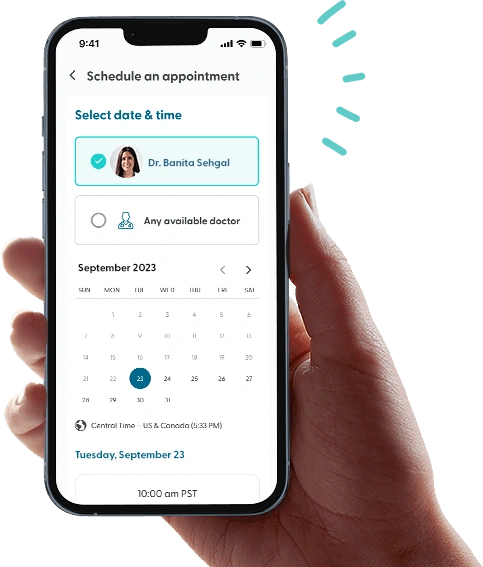Ozempic®, Wegovy®, and Mounjaro®: How are They Different?
Weight management is a common concern in the United States, with nearly 1 in 3 Americans (30.7%) struggling with being overweight.
Additionally, more than 2 in 5 adults (42.4%) have obesity and about 1 in 11 adults (9.2%) have severe obesity.
Although weight loss and management can take time, there are certain medications that may help individuals maximize their results in a shorter period.
In this article, we’ll take a closer look at three of the most common weight management drugs — Ozempic, Wegovy, and Mounjaro — to help you understand how they work.
Get prescription weight loss medication online.
Find out if you're eligible for GLP-1s, and get started on your weight loss journey for as low as $75/month.


Ozempic
Ozempic is an injectable glucagon-like peptide 1 (GLP-1) drug that is primarily used for treating type 2 diabetes in adults.
It contains the active ingredient semaglutide that helps the body regulate blood sugar levels and lowers the overall risk of events like heart attacks and strokes.
What is Ozempic used for?
Although Ozempic is primarily used to treat type 2 diabetes, it has recently gained popularity as a weight loss drug.
Research has found that the use of prescription drugs like Ozempic increased by over 111% from 2022 to 2023 due to its effectiveness in helping people lose weight.
It works by inducing a sensation of fullness, which suppresses an individual’s appetite and slows down the digestive system.
Ozempic also promotes insulin production in the pancreas, helping the body to manage blood sugar levels.
While Ozempic can be helpful for weight management, it’s important to note that most doctors prescribe its use alongside significant lifestyle changes — including getting more exercise, eating better, and avoiding alcohol.
Does Ozempic have any side effects?
Ozempic side effects are common and may include:
Nausea
Vomiting
Diarrhea or constipation
Abdominal pain
Loss of appetite
Skin reactions at the injection site
Hypoglycemia (low blood sugar) -- Ozempic itself doesn't cause hypoglycemia, but it can make the other medications more effective at lowering glucose. Be sure to discuss all medications you are taking with your doctor when considering Ozempic, as it may have adverse interactions with other drugs.
These side effects tend to be mild to moderate and may improve as the body gets used to the medication. In rare cases, Ozempic may cause severe side effects such as:
Pancreatitis (inflammation of the pancreas)
Kidney and gallbladder issues
Allergic reactions
Thyroid tumors
If you experience persistent or severe side effects, be sure to speak with your healthcare provider. They will be able to adjust or stop your treatment as needed.
Is Ozempic FDA-approved?
Ozempic is an FDA-approved drug. However, it has only been approved for the management of type 2 diabetes.
A recommended weekly dose of 0.25 mg is advised for initial use. If the individual responds well to the injection, the dosage can be increased to 0.5 mg after one month.
The efficacy of Ozempic as a weight loss drug is still under evaluation.
What are the long-term effects of using Ozempic?
GLP-1 medications like Ozempic are generally safe for long-term use since they are primarily administered for lifelong chronic diseases.
However, certain groups of people shouldn’t use Ozempic because it can worsen existing medical conditions. People with one or more of the following should avoid Ozempic:
Kidney or pancreatic disease
Type 1 diabetes
Diabetic retinopathy
A family history of thyroid cancer
Multiple endocrine neoplasia type 2 (MEN2)
More research is needed to confirm any other physical long-term effects of Ozempic.
How should Ozempic be administered?
Ozempic should be injected weekly with or without meals. It doesn’t matter what time you administer an Ozempic injection as long as you take it on the same day each week.
The FDA recommends injecting Ozempic into the abdomen, thigh, or upper arm. It’s also recommended to use a different injection site each week to reduce the risk of skin irritation.
Before using Ozempic, be sure to check the liquid's appearance. It should be clear and colorless. If particles or discoloration can be seen, do not use the injection, as the medication may be spoiled.
Key Point: What Should I Do if I Miss an Ozempic Dose?
If a dose is missed, the FDA recommends administering the Ozempic injection within five days. Do not administer two doses on one day but allow for 48 hours to pass before injecting yourself again.
If more than five days have passed, skip the missed dose and administer your next injection on the regularly scheduled day.
How long does it take for Ozempic to work?
Current studies suggest that Ozempic may need to be taken for eight weeks or longer for visible results.
Your appetite and blood sugar levels will adjust immediately after taking your first dose of Ozempic, but remember: losing weight takes time.
It’s also crucial to maintain a regular exercise routine and eat a healthy diet for Ozempic to be most effective.
Wegovy
Wegovy is a medication that treats overweight or obese adults. It’s the only one out of the three drugs covered here that is primarily intended for weight management.
Wegovy is a GLP-1 agonist medication that regulates appetite and blood sugar levels. It relies on the same formula as Ozempic but has a different dosing schedule.
Wegovy is known as an effective weight-loss drug, with some studies showing that patients lost an average of 15% of their body mass while using Wegovy.
It’s also been shown to lower cardiovascular disease by reducing the risk of heart attacks, and stroke.
Which conditions does Wegovy treat?
Wegovy is primarily used to treat chronic overweight conditions. It works by mimicking the effects of the GLP-1 chemical in the body that regulates metabolism, appetite, and digestion.
This helps to control food intake, which can lead to weight loss over time.
Key Point: Can I Use Wegovy if I Don’t Have a Chronic Health Condition?
The use of Wegovy is specifically indicated for chronic weight management in adults or for individuals who meet specific criteria related to health conditions.
Wegovy isn’t currently approved for cosmetic weight loss purposes.
Your healthcare provider will help you to determine if it’s an appropriate drug for you and will recommend other medications if necessary.
Does Wegovy cause any side effects?
Wegovy may cause certain side effects, although not everyone experiences them. Common side effects may include:
Nausea
Diarrhea
Vomiting
Constipation
Abdominal pain
Headache
Fatigue
Hypoglycemia (low blood sugar) when used with antidiabetic medications
Changes in vision
Increased heart rate
Dizziness
Heartburn
More serious side effects are rare, but can occur. These may include:
Pancreatitis (inflammation of the pancreas)
Gallbladder and kidney problems
Allergic reactions
Increased risk of developing thyroid cancer
Mental health issues
If you experience any severe side effects or are concerned about them, be sure to seek medical attention as soon as possible.
Has Wegovy been approved by the FDA?
Wegovy has been approved by the FDA for use in chronic weight management. The FDA recommends a weekly injection of up to 2.4 mg, administered in the abdomen, upper arm, or thigh.
In addition to the injection, the FDA also recommends following a reduced-calorie diet and increasing physical activity when using Wegovy.
Wegovy should not be used alongside any other GLP-1 drugs because this increases gastrointestinal discomfort that may cause long-term health issues.
As of December 2022, Wegovy is also approved for teens aged 12 and up who require chronic weight management.
Key Point: Is There a Generic Version of Wegovy?
There is currently no generic version of Wegovy available on the market. You can speak to your doctor about alternative treatment options that may have similar effects to Wegovy.
How should I use Wegovy?
Wegovy is a single-use pre-filled injection that should be administered weekly and under the skin. You can administer the injection at any time as long as it’s on the same day each week.
The recommended starting dosage is 0.25 mg per week for one month. In the second month, the dosage can be increased to 0.5 mg and 1 mg in the third.
During your fourth month of use, a higher dose can be taken, and the amount can be increased to 1.7 mg. You can start taking the maximum dosage of 2.4 mg on the fifth month of use.
The FDA recommends varying injection sites each week to avoid skin irritation. Wegovy may be taken with or without food.
Key Point: What Happens if I Miss a Dose?
You can administer a missed Wegovy dose at least two days before or after your regularly scheduled injection.
Do not administer two dosages on the same day. Taking too much Wegovy can cause severe nausea, vomiting, and low blood sugar.
If you’ve missed your dosages for more than two weeks, you should talk to your doctor about how to safely restart your treatment.
Are there any long-term side effects associated with Wegovy?
Since Wegovy is a relatively new medication, there is limited information on its long-term effects.
More research and continued monitoring is needed to better understand how prolonged use of Wegovy impacts the body.
Key Point: Who Should Avoid Using Wegovy?
To reduce the risk of health complications, it is currently recommended that the following people avoid using Wegovy:
- Individuals with pancreatic or kidney diseases
- Type 2 diabetics
- Those with diabetic retinopathy
- Individuals with mental health conditions like depression
- Pregnant or breastfeeding mothers
More research needs to be done before the use of Wegovy can be deemed safe for these groups. It’s best to avoid taking Wegovy if you fall into any of these categories. You can speak to your doctor about alternative therapies.
How long until I see results from using Wegovy?
In clinical trials, patients started seeing weight loss results after four weeks of using Wegovy. However, it may take several months before results become visible.
On average, individuals tend to lose around 10%-15% of their body weight over the course of a year of Wegovy treatments.
Remember that the use of Wegovy is prescribed alongside eating a healthy diet and regular exercise. It’s important to incorporate these lifestyle changes into your daily routine to maximize your weight loss results.
Ready to achieve your weight loss goals?
Shed pounds with GLP-1 medication prescribed online by licensed healthcare providers for as low as $75/month.


Mounjaro
Mounjaro is an injectable medication that treats type 2 diabetes in adults. Similar to Ozempic, it helps the body to regulate and maintain healthy insulin levels.
The medication works by acting on two receptors in the body — GLP-1 and glucose-dependent insulinotropic polypeptide (GIP) — that control glucose (sugar).
Mounjaro can then stimulate insulin production in the pancreas while suppressing the hormones that raise blood sugar levels (glucagon).
What is Mounjaro used for?
Mounjaro is primarily used to treat type 2 diabetes in adults, but it has gained popularity as a weight loss medication, similar to Ozempic.
While acting on the GLP-1 and GIP receptors, Mounjaro may also cause a suppressed appetite and a slowed digestive process which helps you feel fuller for longer. Over time, this can lead to reduced food intake which will affect weight.
Can Mounjaro cause any side effects?
Mounjaro can cause mild to moderate side effects that may improve as the body adjusts to the medication. The following side effects are common when using Mounjaro:
Hypoglycemia (low blood sugar)
Pancreatitis (inflammation of the pancreas)
Acute kidney issues
Gastrointestinal problems
Gallbladder problems
Increased risk of developing thyroid tumors
Key Point: Who Should Avoid Using Mounjaro?
Although the effects of Mounjaro on the body are still being studied, certain groups of people are advised not to take this medication. This includes:
- Individuals with a family history of thyroid cancer
- People with a known sensitivity to tirzepatide
- People with diabetic retinopathy
It’s also not clear if Mounjaro is safe for pregnant or breastfeeding women. If you’re already pregnant or breastfeeding, it’s advised to speak to your doctor before using Mounjaro.
Has the FDA approved Mounjaro?
Mounjaro is currently approved by the FDA as a targeted treatment for type 2 diabetes. The FDA recommends supplementing this treatment with a healthy diet and exercise.
The recommended starting dosage is 2.5 mg, injected under the skin on a weekly basis. The dosage can be increased to 2.5 mg increments every four weeks until the maximum of 15 mg is reached.
Mounjaro should be injected in the abdomen, thigh, or upper arm. It’s also recommended to vary the injection site each week to avoid adverse skin reactions.
You can administer Mounjaro before or after meals.
Does Mounjaro cause any long-term effects?
Mounjaro is the first dual-receptor medication and has not been in use for very long. This means that more research is needed to come to a conclusion about the drug’s long-term effects.
When does Mounjaro start to work?
Research suggests that Mounjaro must be administered for up to 28 weeks before significant results are visible. Mounjaro has also been shown to help individuals reach specific weight loss goals up to two months sooner than similar drugs.
While the drug will start to suppress your appetite right away, it may take a while before you lose any weight.
It’s also important to keep in mind that the FDA recommends using Mounjaro alongside regular exercise and following a healthy diet for the best results.
How Do Ozempic, Wegovy, and Mounjaro Compare for Weight Management?
Although each drug is used for weight management, they are slightly different from one another. In the table below, we’ve highlighted the key differences.
How Do Ozempic, Wegovy, and Mounjaro Compare for Weight Management? | ||||
|---|---|---|---|---|
Name | Type | Dosage | Use | Results |
Ozempic | Injectable GLP-1 medication | Up to 8 mg, weekly | Primarily prescribed for type 2 diabetics but may be beneficial for weight management | May take up to eight weeks to work |
Wegovy | Injectable GLP-1 medication | Up to 2.4 mg, weekly | Primarily prescribed for managing a chronic weight-related conditions, used alongside a reduced calorie diet and increased exercises | Visible results may start appearing within four weeks |
Mounjaro | Injectable GLP-2/GIP medication | Up to 15 mg, weekly | Primarily used for managing type 2 diabetes and may also be beneficial for weight management | May take up to 28 weeks before results are noticeable |
Wegovy, Ozempic, or Mounjaro: Which Drug is Right for My Condition?
Choosing the right weight management drug depends on several factors and the decision should be made in consultation with a medical professional.
It’s important to consider the following factors:
Your overall health, medical history, and pre-existing health conditions
Your body mass index (BMI)
Individual weight loss goals
Lifestyle factors like diet and exercise habits
Side effects of each drug
Different weight management drugs can affect your body in various ways, depending on the abovementioned factors.
When consulting with your doctor, it’s important to be honest about your weight management goals. This helps them to make a more accurate recommendation to assist you in reaching your desired weight.
Where Can I Learn More About Weight Loss and Weight Management Techniques?
If you’re struggling with weight management, LifeMD can help you reach your goals.
The LifeMD Weight Management Program combines groundbreaking medications, lab testing, and the knowledge of leading clinicians to create a highly effective — and truly sustainable — weight-loss approach.
Healthcare professionals can prescribe weight management medications — like Ozempic, Wegovy, or Mounjaro — for you, if necessary and if you qualify.
Updated: August 07, 2024
LifeMD makes it easy to stay on top of your health because talking to a doctor, filling your prescriptions, getting your labs done—and more—are all easy and cost-effective. Come discover a healthcare solution built around you and your life.
More articles like this
Feel better with LifeMD.
Your doctor is online and ready to see you.
Join LifeMD today and experience amazing healthcare, discounted labs and prescription medications... plus around-the-clock access to medical guidance.

GLP-1
Ozempic® Wegovy® Zepbound®
This is it! Be part of the weight loss movement everyone’s talking about.
Get Started Now













